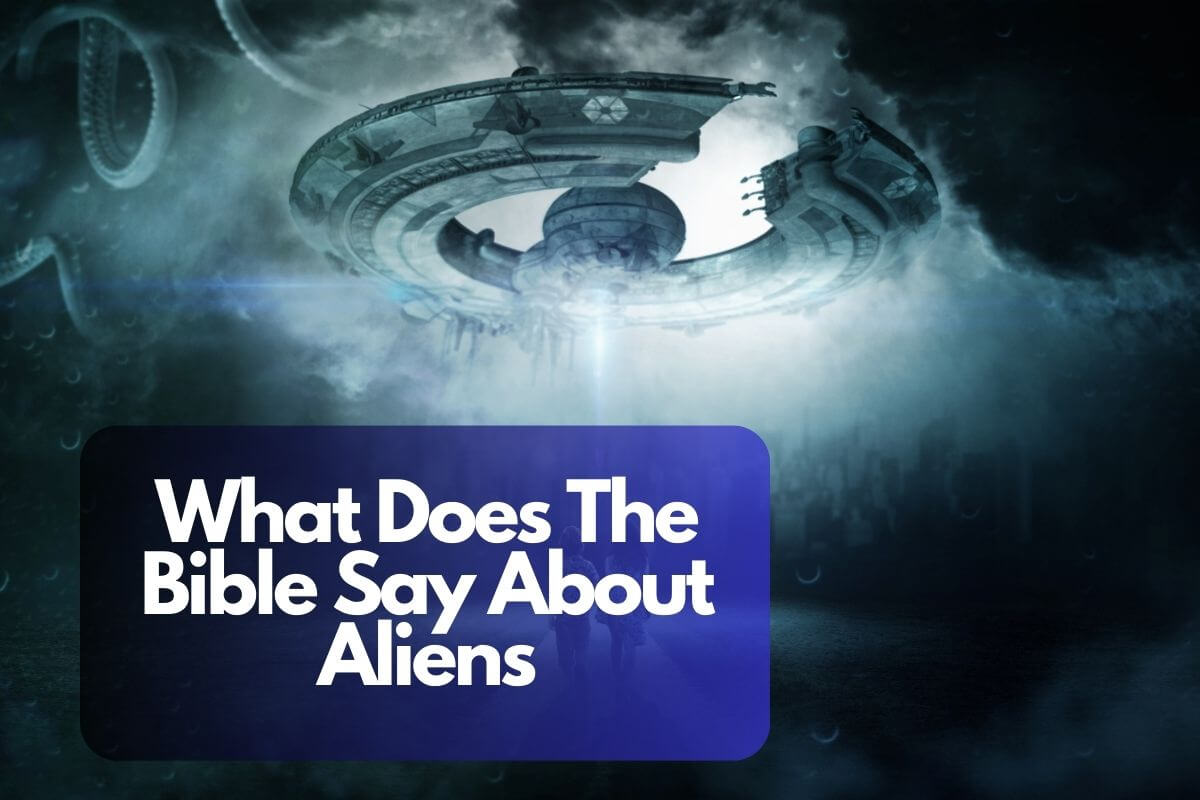In this article, we embark on a thought-provoking journey, seeking to uncover any references or implications regarding extraterrestrial life within the pages of the Bible. We will delve into biblical passages, symbols, and interpretations to shed light on this intriguing topic while acknowledging the diverse perspectives and theological debates that surround it.
What Does The Bible Say About Aliens
The Bible does not explicitly mention or provide direct information about the existence of extraterrestrial life or beings from other planets. The primary focus of the Bible is on the relationship between God and humanity, the nature of sin, salvation, and moral guidance for living a righteous life.
While the Bible does not specifically address aliens, some individuals have interpreted certain biblical passages metaphorically or symbolically to speculate about the existence of extraterrestrial life. However, these interpretations are subjective and not universally accepted within religious communities.
It is important to note that the absence of explicit mention of aliens in the Bible does not prove or disprove their existence. The Bible’s purpose is to provide spiritual guidance and convey theological truths rather than serve as a comprehensive scientific or cosmological manual.
Therefore, discussions about aliens and their place in the universe fall outside the scope of biblical teachings. Exploring the possibility of extraterrestrial life is an intriguing subject that is better approached through scientific inquiry, exploration, and the study of the natural world.
Exploring the Bible’s perspective on aliens
In the midst of this fascination with extraterrestrial life, many individuals turn to religious texts, particularly the Bible, to seek guidance and insights. As one of the most influential and widely read texts in the world, the Bible addresses fundamental questions about human existence, the nature of God, and the purpose of life. Consequently, it is natural to wonder whether the Bible offers any perspective on the existence of aliens or extraterrestrial beings.
Purpose of the article
The purpose of this article is to delve into the topic of what the Bible says about aliens. While the Bible primarily focuses on matters of faith, morality, and spiritual guidance, it contains a rich tapestry of narratives, symbols, and teachings that may provide clues or implications about the existence of intelligent life beyond Earth. By examining biblical passages, exploring theological interpretations, and considering the broader implications of biblical themes, we aim to shed light on the question of whether the Bible offers any insights into the possibility of alien civilizations.
It is important to note that this article does not seek to provide a definitive answer or conclusive proof regarding the existence of aliens as described in modern scientific understanding. Rather, our objective is to engage in a thought-provoking exploration, drawing from the wisdom and teachings of the Bible, to stimulate reflection, discussion, and a deeper understanding of the relationship between faith, science, and the potential existence of extraterrestrial life.
By embarking on this journey, we hope to encourage readers from various backgrounds, whether religious or scientific, to contemplate the mysteries of the universe, the nature of our place within it, and the profound questions that arise as we ponder the possibility of encountering intelligent life beyond our planet.
The Bible and the Origins of Life
Creation account in Genesis
The book of Genesis in the Bible presents a foundational account of the creation of the universe, Earth, and humanity. In the creation narrative, God is depicted as the ultimate creator who brings forth all living things. The focus of the account is primarily on the formation of Earth and the origin of human life. The text describes how God created the heavens, the Earth, plants, animals, and finally, Adam and Eve as the first human beings.
While the creation account in Genesis provides a detailed description of the origins of life on Earth, it does not explicitly address the existence of extraterrestrial life or the creation of life on other planets. The emphasis is on Earth as the specific location where God’s creative acts unfolded.
Humanity as unique or part of a larger creation
The question of whether humanity is considered unique or part of a larger creation is a matter of interpretation and theological perspective. Some interpretations of biblical texts suggest that humans hold a distinct and privileged position in God’s creation. This perspective often stems from the belief that humans are created in the image of God and possess certain qualities and capacities that differentiate them from other earthly beings.
On the other hand, alternative interpretations propose that humanity is part of a broader creation, encompassing not only Earth but potentially other worlds as well. These perspectives argue that God’s creative acts extend beyond Earth, allowing for the possibility of other intelligent life forms in the universe.
Interpretations of “God’s image” and its implications
The phrase “image of God” is a key concept in biblical theology and has been the subject of much discussion and interpretation. Various interpretations exist regarding the meaning and implications of being created in God’s image. Some theologians suggest that it refers to humanity’s unique capacity for rationality, moral agency, and spirituality. This view implies that the image of God is specific to human beings, setting them apart from other earthly creatures.
Others propose a broader understanding of the image of God, suggesting that it encompasses qualities such as relationality, creativity, and stewardship, which may extend beyond humanity to include other intelligent beings. This interpretation leaves open the possibility that if extraterrestrial life exists, it too could bear the image of God in its own unique way.
It is important to note that the Bible does not provide explicit guidance on the existence or nature of extraterrestrial life. The interpretations and theological perspectives surrounding these questions are diverse and often subjective. As a result, individuals and religious communities may hold differing views on the implications of “God’s image” in relation to the potential existence of aliens.
In the quest to understand the Bible’s perspective on aliens, these interpretations and discussions serve as starting points for further exploration and contemplation. They highlight the complex nature of biblical texts and the need for nuanced reflection when considering the possibility of extraterrestrial life within a biblical framework.
Angels and Heavenly Beings
The Bible contains numerous references to angelic beings, often described as heavenly messengers or servants of God. These descriptions depict angels as powerful, intelligent, and spiritual entities who carry out various tasks on behalf of God. Angels are portrayed as beings with supernatural abilities, capable of appearing to humans and interacting with the earthly realm.
Biblical descriptions of angels often highlight their awe-inspiring appearance, with depictions of radiant beings with wings and a human-like form. They are often portrayed as beings of light or as having a celestial and glorious presence. Examples of angelic encounters in the Bible include the angel Gabriel appearing to the Virgin Mary to announce the birth of Jesus and angels visiting the shepherds to proclaim the birth of Christ.
Similarities and differences between angels and aliens
When considering the topic of aliens, it is natural to draw comparisons between angelic beings described in the Bible and hypothetical extraterrestrial life forms. Both angels and aliens are often depicted as beings from realms beyond our own, possessing superior knowledge or abilities. However, it is important to note that there are significant differences in the way these entities are understood within their respective contexts.
Angels, as depicted in the Bible, are spiritual beings with a direct connection to God. They are portrayed as part of a divine hierarchy and are primarily involved in fulfilling God’s purposes on Earth. On the other hand, the concept of aliens typically refers to physical beings from other planets who may have evolved through natural processes.
While angels are often described as messengers or servants of God, aliens, if they exist, would not necessarily have a religious connotation or a specific role in fulfilling divine plans. It is crucial to approach these comparisons with caution, recognizing the distinct theological and scientific frameworks in which they are understood.
Possible interpretations of angelic encounters
The encounters between humans and angels described in the Bible have been the subject of various interpretations throughout history. Some interpret these encounters as literal and historical events, accepting the biblical accounts at face value. Others view these narratives as symbolic or metaphorical, representing deeper spiritual truths or divine communication.
Symbolic interpretations suggest that angelic encounters may serve as manifestations of God’s presence or as expressions of divine messages and guidance. They can also be seen as examples of supernatural interventions in human affairs. Additionally, angelic encounters are sometimes interpreted as glimpses into the spiritual realm, reminding humanity of the interconnectedness between the earthly and the heavenly realms.
When considering the question of extraterrestrial life, some individuals and theologians propose that certain biblical accounts traditionally interpreted as angelic encounters could be reevaluated through the lens of hypothetical alien encounters. This perspective suggests that these encounters could be understood as possible interactions with advanced extraterrestrial beings, rather than purely spiritual entities.
It is important to note that these interpretations are speculative and can vary significantly among different religious and theological traditions. The Bible itself does not explicitly address the topic of encounters with extraterrestrial beings. Therefore, any interpretation of angelic encounters in relation to aliens requires careful consideration, openness to diverse viewpoints, and respectful engagement with both biblical texts and the scientific exploration of the cosmos.
Extraterrestrial References in Symbolism
The Bible often employs symbolic language and imagery to convey its messages and teachings. Symbolism allows for deeper layers of meaning beyond literal interpretation. When examining biblical texts for potential references to extraterrestrial life, it is important to consider the symbolic nature of the language used.
Interpreting symbolic language requires careful analysis of the cultural, historical, and theological context in which the texts were written. Symbols may represent abstract concepts, spiritual realities, or profound truths. By exploring the symbolic language in the Bible, we can uncover potential insights or connections to the topic of extraterrestrial life.
Celestial imagery and its implications
The Bible frequently employs celestial imagery to convey grandeur, majesty, and the divine realm. References to stars, heavens, and heavenly bodies are prevalent throughout the biblical texts. This celestial imagery carries symbolic significance, often representing the glory of God, the transcendence of the divine, or the vastness and beauty of creation.
While celestial imagery does not directly address the topic of extraterrestrial life, it invites contemplation about the broader scope of God’s creation beyond Earth. The vastness of the universe, as symbolized by the celestial imagery in the Bible, can prompt reflection on the potential existence of other worlds and life forms.
Possible connections to extraterrestrial life
Symbolic references in the Bible, particularly those related to divine beings or celestial realms, have led some individuals to explore possible connections to extraterrestrial life. These connections are speculative and subject to interpretation, but they provide intriguing avenues for contemplation.
For example, symbolic descriptions of heavenly beings, such as cherubim or seraphim, with multiple wings and unique forms, have been considered by some as suggestive of beings that could be interpreted as alien or otherworldly. Similarly, passages that mention “hosts” or “armies” in the heavens have sparked discussions about the potential existence of cosmic civilizations.
It is essential to approach these connections with caution, as the symbolic nature of biblical texts allows for various interpretations. Exploring possible connections between biblical symbolism and extraterrestrial life is not meant to provide definitive proof or certainty, but rather to encourage thought-provoking reflections on the mystery and wonder of the universe.
Ultimately, the symbolic language and celestial imagery in the Bible offer a framework for contemplating the vastness of God’s creation and the potential existence of intelligent life beyond Earth. Such reflections can stimulate discussions on the implications of extraterrestrial life within a biblical context and inspire awe for the divine wisdom manifested throughout the cosmos.
Jesus’ Teachings and Extraterrestrial Life
In Christian theology, Jesus Christ is considered the central figure, believed to be the Son of God and the embodiment of divine love and salvation. His teachings, life, death, and resurrection hold significant theological and spiritual importance for Christians worldwide. Understanding Jesus’ role is crucial when considering the potential implications of extraterrestrial life within a biblical framework.
Relevance of Jesus’ message to alien existence
The teachings of Jesus primarily focus on the relationship between God, humanity, and the kingdom of God. Jesus emphasized love, compassion, forgiveness, and the call to follow him as a path to salvation and eternal life. While Jesus’ teachings do not explicitly address the topic of extraterrestrial life, they provide guidance on how to live a life aligned with God’s will and in harmony with others.
From a theological perspective, if extraterrestrial life were to exist, Jesus’ message of love and redemption could potentially extend to those beings as well. Some theologians propose that if intelligent alien civilizations were discovered, they would also be part of God’s creation and subject to the universal principles of divine love and grace.
Interpreting Jesus’ role in a universe with aliens
The question of how to interpret Jesus’ role in a universe with aliens is complex and subject to various theological perspectives. Some individuals and religious communities may assert that Jesus’ redemptive work on Earth is unique to humanity, based on the belief that Jesus became human to offer salvation specifically to the human race.
On the other hand, alternative theological viewpoints propose that Jesus’ redemptive work has universal implications, extending beyond humanity to encompass any intelligent beings in the universe. This perspective suggests that if aliens exist, they too could benefit from the salvific power of Jesus’ life, death, and resurrection.
Interpreting Jesus’ role in a universe with aliens requires thoughtful theological reflection and a willingness to engage in dialogue across different theological traditions. It raises profound questions about the nature of God’s plan, the extent of salvation, and the relationship between the divine and all potential intelligent life forms.
While the Bible does not provide explicit answers regarding Jesus’ role in relation to extraterrestrial life, contemplating this topic invites deeper reflection on the boundless nature of God’s love and the mysteries of divine providence. It prompts us to consider the implications of Jesus’ teachings and the potential reach of his redemptive work in a vast and diverse cosmos, filled with the possibility of intelligent beings beyond Earth.
Diversity of theological opinions on extraterrestrial life
The question of extraterrestrial life has sparked a wide range of theological opinions and debates within religious communities. Theological perspectives on this topic vary greatly, influenced by factors such as scriptural interpretations, cultural context, and individual theological frameworks.
Some theologians and religious traditions maintain that humanity is unique and that Earth is the sole place where God’s plan for creation unfolds. They may argue that the absence of explicit biblical references to aliens implies that extraterrestrial life does not exist. Others, however, propose that the vastness of the universe suggests the possibility of life beyond Earth and that God’s creative work may extend to other worlds.
Views on the uniqueness of humanity and Earth
The concept of the uniqueness of humanity and Earth is a significant point of discussion among theologians. Some argue that human beings hold a special place in God’s creation, based on scriptural teachings that emphasize humanity’s creation in the image of God and the unique role assigned to humans as stewards of Earth.
In contrast, alternative theological perspectives emphasize the interconnectedness of all creation and propose that the uniqueness of humanity lies in our capacity for relationship with God, moral agency, and spiritual growth. They suggest that God’s creation is vast and diverse, and that Earth may be just one of many environments where life exists and evolves.
Ethics, redemption, and salvation in relation to aliens
Theological discussions on extraterrestrial life often involve considerations of ethics, redemption, and salvation. Questions arise about the moral implications of our potential encounters with alien civilizations and how our understanding of redemption and salvation may apply to them.
Some theologians propose that if extraterrestrial life exists and possesses moral agency, they could be subjects of God’s redemptive plan. They argue that if these beings have fallen into sin, they may also require reconciliation with God and the offer of salvation.
Others explore the idea that aliens, if they exist, may have a separate relationship with God, guided by their own religious or spiritual traditions. In this perspective, the salvation and redemption offered through Jesus Christ may be specific to the human experience on Earth, while acknowledging the possibility of divine interaction with other intelligent beings in unique ways.
Debates surrounding ethics, redemption, and salvation in relation to aliens are complex and often speculative. Theological perspectives on these matters differ, reflecting the diverse ways in which religious traditions grapple with the implications of extraterrestrial life within their respective theological frameworks.
Engaging in these debates invites profound reflections on the nature of God’s love, the scope of redemption, and the role of humanity in the larger cosmic order. It encourages theological exploration and dialogue, seeking to discern the potential theological implications of the existence of intelligent life beyond our planet.
Scientific Discoveries and Biblical Interpretation
Advancements in astronomy and space exploration have expanded our knowledge of the universe and increased our understanding of planetary systems. Scientists have discovered numerous exoplanets, some of which are located within the habitable zone of their host stars, suggesting conditions potentially suitable for life as we know it.
These scientific discoveries have prompted theological reflections on the potential existence of extraterrestrial life and its compatibility with biblical teachings. The exploration of habitable planets and the search for signs of life beyond Earth have sparked both excitement and contemplation about our place in the cosmos.
Reevaluating biblical passages in light of scientific knowledge
Scientific advancements often necessitate reevaluating biblical passages in light of new knowledge. As our understanding of the natural world expands, there is a need to interpret biblical texts in ways that are consistent with scientific findings.
When considering the topic of extraterrestrial life, theologians may revisit certain biblical passages, such as creation accounts, to explore their compatibility with scientific knowledge. This reevaluation involves an open and critical examination of biblical texts, seeking a deeper understanding of their intended messages while respecting their historical and cultural contexts.
Coexistence of science and faith in exploring alien life
The coexistence of science and faith is an ongoing dialogue within religious communities. Many individuals and religious traditions embrace both scientific exploration and faith, recognizing that they can complement and enrich one another.
Regarding the exploration of alien life, some theologians propose that scientific discoveries in this field can deepen our appreciation of God’s creative power and expand our understanding of the vastness and diversity of the universe. They argue that scientific knowledge can enhance, rather than undermine, theological contemplation.
Furthermore, the existence of extraterrestrial life, if confirmed, would not necessarily challenge religious beliefs or the foundations of faith. Instead, it could prompt a reassessment of theological frameworks to accommodate the presence of other intelligent beings in the cosmos.
The coexistence of science and faith requires an approach that embraces intellectual curiosity, critical thinking, and a willingness to engage in respectful dialogue. It recognizes that scientific discoveries and biblical interpretations are not necessarily in conflict but can coexist harmoniously, shedding light on different aspects of reality and providing different avenues for understanding our place in the universe.
Ultimately, the exploration of alien life invites us to navigate the intersection of scientific discoveries and biblical interpretations, fostering a spirit of intellectual inquiry, humility, and reverence as we seek to deepen our understanding of both the natural world and our faith.
Conclusion
Throughout this article, we have explored various aspects of the topic “What Does The Bible Say About Aliens.” We began by acknowledging the fascination with extraterrestrial life and the curiosity it sparks. We then delved into the biblical perspectives on aliens, considering the creation account in Genesis, the uniqueness of humanity, and the interpretation of “God’s image.” We also examined the descriptions of angelic beings in the Bible and explored the similarities and differences between angels and aliens. Furthermore, we discussed the possible interpretations of angelic encounters and the symbolism related to extraterrestrial references.
The exploration of what the Bible says about aliens is an ongoing and thought-provoking endeavor. It invites further exploration, dialogue, and open-mindedness. As scientific knowledge advances and theological perspectives evolve, there is room for continued reflection, conversation, and the integration of new insights. Encouraging respectful and intellectually rigorous dialogue between scientific and religious communities can lead to a deeper understanding of the mysteries of the universe and our place within it.
Contemplating the potential existence of extraterrestrial life also invites us to reflect on the spiritual and theological significance it may hold. The existence of intelligent beings beyond Earth, if confirmed, could expand our understanding of God’s creation and challenge our perspectives on redemption, salvation, and the nature of divine providence. It calls us to ponder the boundless love and wisdom of God and the interconnectedness of all creation.







